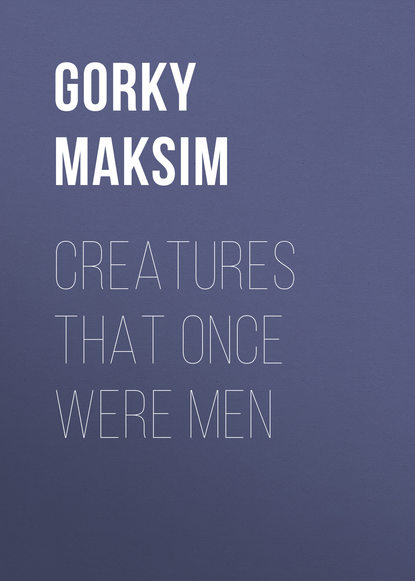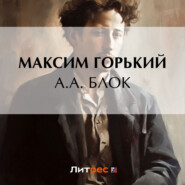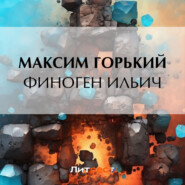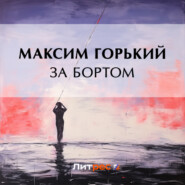По всем вопросам обращайтесь на: info@litportal.ru
(©) 2003-2025.
✖
Creatures That Once Were Men
Настройки чтения
Размер шрифта
Высота строк
Поля
101 CREATURES THAT ONCE WERE MEN
"You are my witnesses, Sir Inspector, and you good people!"
"We are not good people, merchant!" said the voice of Abyedok, trembling with anger.
The Inspector whistled impatiently, with his other hand protecting Petunikoff, who was stooping in front of him as if trying to enter his belly.
"You dirty toad! I shall compel you to kiss the feet of the dead man.
How would you like that?" And catching Petunikoff by the neck, Kuvalda hurled him against the door, as if he bad been a cat.
The "creatures that once were men" sprang aside quickly to let the merchant fall. And down he fell at their feet, crying wildly:
"Murder! Help! Murder!"
Martyanoff slowly raised his foot, and brought it down heavily on the merchant's head. Abyedok spat in his face with a grin. The merchant, creeping on all-fours, threw himself into the courtyard, at which everyone laughed. But by this time the two policemen had arrived, and pointing to Kuvalda, the Inspector said, pompously:
"Arrest him, and bind him hand and foot!"
"You dare not!.. I shall not run away.. I will go wherever you wish,." said Kuvalda, freeing himself from the policemen at his side.
The "creatures that once were men" disappeared one after the other. A cart entered the yard. Some ragged wretches brought out the dead man's body.
"I'll teach you! You just wait!" thundered the Inspector at Kuvalda.
"How now, ataman?" asked Petunikoff maliciously, excited and pleased at the sight of his enemy in bonds. "That, you fell into the trap? Eh? You just wait.."
But Kuvalda was quiet now. He stood strangely straight and silent between the two policemen, watching the teacher's body being placed in the cart. The man who was holding the head of the corpse was very short, and could not manage to place it on the cart at the same time as the legs. For a moment the body hung as if it would fall to the ground, and hide itself beneath the earth, away from these foolish and wicked disturbers of its peace.
"Take him away!" ordered the Inspector, pointing to the Captain.
Kuvalda silently moved forward without protestation, passing the cart on which was the teacher's body. He bowed his head before it without looking. Martyanoff, with his strong face, followed him. The courtyard of the merchant Petunikoff emptied quickly.
"Now then, go on!" called the driver, striking the horses with the whip. The cart moved off over the rough surface of the courtyard. The teacher was covered with a heap of rags, and his belly projected from beneath them. It seemed as if he were laughing quietly at the prospect of leaving the dosshouse, never, never to return. Petunikoff, who was following him with his eyes, crossed himself, and then began to shake the dust and rubbish off his clothes, and the more he shook himself the more pleased and self-satisfied did he feel. He saw the tall figure of Aristid Fomich Kuvalda, in a gray cap with a red band, with his arms bound behind his back, being led away. Petunikoff smiled the smile of the conqueror, and went back into the dosshouse, but suddenly he stopped and trembled. At the door facing him stood an old man with a stick in his hand and a large bag on his back, a horrible old man in rags and tatters, which covered his bony figure. He bent under the weight of his burden, and lowered his head on his breast, as if he wished to attack the merchant.
"What are you? Who are you?" shouted Petunikoff.
"A man." he answered in a hoarse voice. This hoarseness pleased and tranquillized Petunikoff, he even smiled.
"A man! And are there really men like you?" Stepping aside he let the old man pass. He went, saying slowly:
"Men are of various kinds.. as God wills.. There are worse than me.. still worse.. Yes.."
The cloudy sky hung silently over the dirty yard and over the cleanly-dressed man with the pointed beard, who was walking about there, measuring distances with his steps and with his sharp eyes. On the roof of the old house a crow perched and croaked, thrusting its head now backward, now forward. In the lowering gray clouds, which hid the sky, there was something hard and merciless, as if they had gathered together to wash all the dirt off the face of this unfortunate, suffering, and sorrowful earth.
TWENTY-SIX MEN AND A GIRL
There were six-and-twenty of us – six-and-twenty living machines in a damp, underground cellar, where from morning till night we kneaded dough and rolled it into kringels. Opposite the underground window of our cellar was a bricked area, green and mouldy with moisture. The window was protected from outside with a close iron grating, and the light of the sun could not pierce through the window panes, covered as they were with flour dust.
Our employer had bars placed in front of the windows, so that we should not be able to give a bit of his bread to passing beggars, or to any of our fellows who were out of work and hungry. Our employer called us rogues, and gave us half-rotten tripe to eat for our mid-day meal, instead of meat. It was swelteringly close for us cooped up in that stone underground chamber, under the low, heavy, soot-blackened, cobwebby ceiling. Dreary and sickening was our life between its thick, dirty, mouldy walls.
Unrefreshed, and with a feeling of not having had our sleep out, we used to get up at five o'clock in the morning; and before six, we were already seated, worn out and apathetic, at the table, rolling out the dough which our mates had already prepared while we slept.
The whole day, from ten in the early morning until ten at night, some of us sat round that table, working up in our hands the yielding paste, rolling it to and fro so that it should not get stiff; while the others kneaded the swelling mass of dough. And the whole day the simmering water in the kettle, where the kringels were being cooked, sang low and sadly; and the baker's shovel scraped harshly over the oven floor, as he threw the slippery bits of dough out of the kettle on the heated bricks.
From morning till evening wood was burning in the oven, and the red glow of the fire gleamed and flickered over the walls of the bake-shop, as if silently mocking us. The giant oven was like the misshapen head of a monster in a fairy tale; it thrust itself up out of the floor, opened wide jaws, full of glowing fire, and blew hot breath upon us; it seemed to be ever watching out of its black air-holes our interminable work. Those two deep holes were like eyes: the cold, pitiless eyes of a monster. They watched us always with the same darkened glance, as if they were weary of seeing before them such eternal slaves, from whom they could expect nothing human, and therefore scorned them with the cold scorn of wisdom.
In meal dust, in the mud which we brought in from the yard on our boots, in the hot, sticky atmosphere, day in, day out, we rolled the dough into kringels, which we moistened with our own sweat. And we hated our work with a glowing hatred; we never ate what had passed through our hands, and preferred black bread to kringels.
Sitting opposite each other, at a long table – nine facing nine – we moved our hands and fingers mechanically during endlessly long hours, till we were so accustomed to our monotonous work that we ceased to pay any attention to it.
We had all studied each other so constantly, that each of us knew every wrinkle of his mates' faces. It was not long also before we had exhausted almost every topic of conversation; that is why we were most of the time silent, unless we were chaffing each other; but one cannot always find something about which to chaff another man, especially when that man is one's mate. Neither were we much given to finding fault with one another; how, indeed, could one of us poor devils be in a position to find fault with another, when we were all of us half dead and, as it were, turned to stone? For the heavy drudgery seemed to crush all feeling out of us. But silence is only terrible and fearful for those who have said everything and have nothing more to say to each other; for men, on the contrary, who have never begun to communicate with one another, it is easy and simple.
Sometimes, too, we sang; and this is how it happened that we began to sing: one of us would sigh deeply in the midst of our toil, like an overdriven horse, and then we would begin one of those songs whose gentle swaying melody seems always to ease the burden on the singer's heart.
At first one sang by himself, and we others sat in silence listening to his solitary song, which, under the heavy vaulted roof of the cellar, died gradually away, and became extinguished, like a little fire in the steppes, on a wet autumn night, when the gray heaven hangs like a heavy mass over the earth.
Then another would join in with the singer, and now two soft, sad voices would break into song in our narrow, dull hole of a cellar. Suddenly others would join in, and the song would roll forward like a wave, would grow louder and swell upward, till it would seem as if the damp, foul walls of our stone prison were widening out and opening. Then, all six-and-twenty of us would be singing; our loud, harmonious song would fill the whole cellar, our voices would travel outside and beyond, striking, as it were, against the walls in moaning sobs and sighs, moving our hearts with soft, tantalizing ache, tearing open old wounds, and awakening longings.
The singers would sigh deeply and heavily; suddenly one would become silent and listen to the others singing, then let his voice flow once more in the common tide. Another would exclaim in a stifled voice, "Ah!" and would shut his eyes, while the deep, full sound waves would show him, as it were, a road, in front of him – a sunlit, broad road in the distance, which he himself, in thought wandered along.
But the flame flickers once more in the huge oven, the baker scrapes incessantly with his shovel, the water simmers in the kettle, and the flicker of the fire on the wall dances as before in silent mockery. While in other men's words we sing out our dumb grief, the weary burden of live men robbed of the sunlight, the burden of slaves.
So we lived, we six-and-twenty, in the vault-like cellar of a great stone house, and we suffered each one of us, as if we had to bear on our shoulders the whole three storys of that house.
But we had something else good, besides the singing – something we loved, that perhaps took the place of the sunshine.
In the second story of our house there was established a gold-embroiderer's shop, and there, living among the other embroidery girls, was Tanya, a little maid-servant of sixteen. Every morning there peeped in through the glass door a rosy little face, with merry blue eyes; while a ringing, tender voice called out to us:
"Little prisoners! Have you any knugels, please, for me?"
At that clear sound, we knew so well, we all used to turn round, gazing with simple-hearted joy at the pure girlish face which smiled at us so sweetly. The sight of the small nose pressed against the window-pane, and of the white teeth gleaming between the half-open lips, had become for us a daily pleasure. Tumbling over each other we used to jump up to open the door, and she would step in, bright and cheerful, holding out her apron, with her head thrown on one side, and a smile on her lips. Her thick, long chestnut hair fell over her shoulder and across her breast. But we, ugly, dirty and misshapen as we were, looked up at her – the threshold door was four steps above the floor – looked up at her with heads thrown back, wishing her good-morning, and speaking strange, unaccustomed words, which we kept for her only.
Our voices became softer when we spoke to her, our jests were lighter. For her – everything was different with us. The baker took from his oven a shovel of the best and the brownest kringels, and threw them deftly into Tanya's apron.
"Be off with you now, or the boss will catch you!" we warned her each time. She laughed roguishly, called out cheerfully: "Good-bye, poor prisoners!" and slipped away as quick as a mouse.
That was all. But long after she had gone we talked about her to one another with pleasure. It was always the same thing as we had said yesterday and the day before, because everything about us, including ourselves and her, remained the same – as yesterday – and as always.
Painful and terrible it is when a man goes on living, while nothing changes around him; and when such an existence does not finally kill his soul, then the monotony becomes with time, even more and more painful. Generally we spoke about women in such a way, that sometimes it was loathsome to us ourselves to hear our rude, shameless talk. The women whom we knew deserved perhaps nothing better. But about Tanya we never let fall an evil word; none of us ever ventured so much as to lay a hand on her, even too free a jest she never heard from us. Maybe this was so because she never remained for long with us; she flashed on our eyes like a star falling from the sky, and vanished; and maybe because she was little and very beautiful, and everything beautiful calls forth respect, even in coarse people.
And besides – though our life of penal labor had made us dull beasts, oxen, we were still men, and, like all men, could not live without worshipping something or other. Better than her we had none, and none but her took any notice of us, living in the cellar – no one, though there were dozens of people in the house. And then, to – most likely, this was the chief thing – we all regarded her as something of our own, something existing as it were only by virtue of our kringels. We took on ourselves in turns the duty of providing her with hot kringels, and this became for us like a daily sacrifice to our idol, it became almost a sacred rite, and every day it bound us more closely to her. Besides kringels, we gave Tanya a great deal of advice to wear warmer clothes, not to run upstairs too quickly, not to carry heavy bundles of wood. She listened to all our counsels with a smile, answered them by a laugh, and never took our advice, but we were not offended at that; all we wanted was to show how much care we bestowed upon her.
Often she would apply to us with different requests, she asked us, for instance; to open the heavy door into the store-cellar, and to chop wood: with delight and a sort of pride, we did this for her, and everything else she wanted.
But when one of us asked her to mend his solitary shirt for him, she said, with a laugh of contempt:
"What next! A likely idea!"
"You are my witnesses, Sir Inspector, and you good people!"
"We are not good people, merchant!" said the voice of Abyedok, trembling with anger.
The Inspector whistled impatiently, with his other hand protecting Petunikoff, who was stooping in front of him as if trying to enter his belly.
"You dirty toad! I shall compel you to kiss the feet of the dead man.
How would you like that?" And catching Petunikoff by the neck, Kuvalda hurled him against the door, as if he bad been a cat.
The "creatures that once were men" sprang aside quickly to let the merchant fall. And down he fell at their feet, crying wildly:
"Murder! Help! Murder!"
Martyanoff slowly raised his foot, and brought it down heavily on the merchant's head. Abyedok spat in his face with a grin. The merchant, creeping on all-fours, threw himself into the courtyard, at which everyone laughed. But by this time the two policemen had arrived, and pointing to Kuvalda, the Inspector said, pompously:
"Arrest him, and bind him hand and foot!"
"You dare not!.. I shall not run away.. I will go wherever you wish,." said Kuvalda, freeing himself from the policemen at his side.
The "creatures that once were men" disappeared one after the other. A cart entered the yard. Some ragged wretches brought out the dead man's body.
"I'll teach you! You just wait!" thundered the Inspector at Kuvalda.
"How now, ataman?" asked Petunikoff maliciously, excited and pleased at the sight of his enemy in bonds. "That, you fell into the trap? Eh? You just wait.."
But Kuvalda was quiet now. He stood strangely straight and silent between the two policemen, watching the teacher's body being placed in the cart. The man who was holding the head of the corpse was very short, and could not manage to place it on the cart at the same time as the legs. For a moment the body hung as if it would fall to the ground, and hide itself beneath the earth, away from these foolish and wicked disturbers of its peace.
"Take him away!" ordered the Inspector, pointing to the Captain.
Kuvalda silently moved forward without protestation, passing the cart on which was the teacher's body. He bowed his head before it without looking. Martyanoff, with his strong face, followed him. The courtyard of the merchant Petunikoff emptied quickly.
"Now then, go on!" called the driver, striking the horses with the whip. The cart moved off over the rough surface of the courtyard. The teacher was covered with a heap of rags, and his belly projected from beneath them. It seemed as if he were laughing quietly at the prospect of leaving the dosshouse, never, never to return. Petunikoff, who was following him with his eyes, crossed himself, and then began to shake the dust and rubbish off his clothes, and the more he shook himself the more pleased and self-satisfied did he feel. He saw the tall figure of Aristid Fomich Kuvalda, in a gray cap with a red band, with his arms bound behind his back, being led away. Petunikoff smiled the smile of the conqueror, and went back into the dosshouse, but suddenly he stopped and trembled. At the door facing him stood an old man with a stick in his hand and a large bag on his back, a horrible old man in rags and tatters, which covered his bony figure. He bent under the weight of his burden, and lowered his head on his breast, as if he wished to attack the merchant.
"What are you? Who are you?" shouted Petunikoff.
"A man." he answered in a hoarse voice. This hoarseness pleased and tranquillized Petunikoff, he even smiled.
"A man! And are there really men like you?" Stepping aside he let the old man pass. He went, saying slowly:
"Men are of various kinds.. as God wills.. There are worse than me.. still worse.. Yes.."
The cloudy sky hung silently over the dirty yard and over the cleanly-dressed man with the pointed beard, who was walking about there, measuring distances with his steps and with his sharp eyes. On the roof of the old house a crow perched and croaked, thrusting its head now backward, now forward. In the lowering gray clouds, which hid the sky, there was something hard and merciless, as if they had gathered together to wash all the dirt off the face of this unfortunate, suffering, and sorrowful earth.
TWENTY-SIX MEN AND A GIRL
There were six-and-twenty of us – six-and-twenty living machines in a damp, underground cellar, where from morning till night we kneaded dough and rolled it into kringels. Opposite the underground window of our cellar was a bricked area, green and mouldy with moisture. The window was protected from outside with a close iron grating, and the light of the sun could not pierce through the window panes, covered as they were with flour dust.
Our employer had bars placed in front of the windows, so that we should not be able to give a bit of his bread to passing beggars, or to any of our fellows who were out of work and hungry. Our employer called us rogues, and gave us half-rotten tripe to eat for our mid-day meal, instead of meat. It was swelteringly close for us cooped up in that stone underground chamber, under the low, heavy, soot-blackened, cobwebby ceiling. Dreary and sickening was our life between its thick, dirty, mouldy walls.
Unrefreshed, and with a feeling of not having had our sleep out, we used to get up at five o'clock in the morning; and before six, we were already seated, worn out and apathetic, at the table, rolling out the dough which our mates had already prepared while we slept.
The whole day, from ten in the early morning until ten at night, some of us sat round that table, working up in our hands the yielding paste, rolling it to and fro so that it should not get stiff; while the others kneaded the swelling mass of dough. And the whole day the simmering water in the kettle, where the kringels were being cooked, sang low and sadly; and the baker's shovel scraped harshly over the oven floor, as he threw the slippery bits of dough out of the kettle on the heated bricks.
From morning till evening wood was burning in the oven, and the red glow of the fire gleamed and flickered over the walls of the bake-shop, as if silently mocking us. The giant oven was like the misshapen head of a monster in a fairy tale; it thrust itself up out of the floor, opened wide jaws, full of glowing fire, and blew hot breath upon us; it seemed to be ever watching out of its black air-holes our interminable work. Those two deep holes were like eyes: the cold, pitiless eyes of a monster. They watched us always with the same darkened glance, as if they were weary of seeing before them such eternal slaves, from whom they could expect nothing human, and therefore scorned them with the cold scorn of wisdom.
In meal dust, in the mud which we brought in from the yard on our boots, in the hot, sticky atmosphere, day in, day out, we rolled the dough into kringels, which we moistened with our own sweat. And we hated our work with a glowing hatred; we never ate what had passed through our hands, and preferred black bread to kringels.
Sitting opposite each other, at a long table – nine facing nine – we moved our hands and fingers mechanically during endlessly long hours, till we were so accustomed to our monotonous work that we ceased to pay any attention to it.
We had all studied each other so constantly, that each of us knew every wrinkle of his mates' faces. It was not long also before we had exhausted almost every topic of conversation; that is why we were most of the time silent, unless we were chaffing each other; but one cannot always find something about which to chaff another man, especially when that man is one's mate. Neither were we much given to finding fault with one another; how, indeed, could one of us poor devils be in a position to find fault with another, when we were all of us half dead and, as it were, turned to stone? For the heavy drudgery seemed to crush all feeling out of us. But silence is only terrible and fearful for those who have said everything and have nothing more to say to each other; for men, on the contrary, who have never begun to communicate with one another, it is easy and simple.
Sometimes, too, we sang; and this is how it happened that we began to sing: one of us would sigh deeply in the midst of our toil, like an overdriven horse, and then we would begin one of those songs whose gentle swaying melody seems always to ease the burden on the singer's heart.
At first one sang by himself, and we others sat in silence listening to his solitary song, which, under the heavy vaulted roof of the cellar, died gradually away, and became extinguished, like a little fire in the steppes, on a wet autumn night, when the gray heaven hangs like a heavy mass over the earth.
Then another would join in with the singer, and now two soft, sad voices would break into song in our narrow, dull hole of a cellar. Suddenly others would join in, and the song would roll forward like a wave, would grow louder and swell upward, till it would seem as if the damp, foul walls of our stone prison were widening out and opening. Then, all six-and-twenty of us would be singing; our loud, harmonious song would fill the whole cellar, our voices would travel outside and beyond, striking, as it were, against the walls in moaning sobs and sighs, moving our hearts with soft, tantalizing ache, tearing open old wounds, and awakening longings.
The singers would sigh deeply and heavily; suddenly one would become silent and listen to the others singing, then let his voice flow once more in the common tide. Another would exclaim in a stifled voice, "Ah!" and would shut his eyes, while the deep, full sound waves would show him, as it were, a road, in front of him – a sunlit, broad road in the distance, which he himself, in thought wandered along.
But the flame flickers once more in the huge oven, the baker scrapes incessantly with his shovel, the water simmers in the kettle, and the flicker of the fire on the wall dances as before in silent mockery. While in other men's words we sing out our dumb grief, the weary burden of live men robbed of the sunlight, the burden of slaves.
So we lived, we six-and-twenty, in the vault-like cellar of a great stone house, and we suffered each one of us, as if we had to bear on our shoulders the whole three storys of that house.
But we had something else good, besides the singing – something we loved, that perhaps took the place of the sunshine.
In the second story of our house there was established a gold-embroiderer's shop, and there, living among the other embroidery girls, was Tanya, a little maid-servant of sixteen. Every morning there peeped in through the glass door a rosy little face, with merry blue eyes; while a ringing, tender voice called out to us:
"Little prisoners! Have you any knugels, please, for me?"
At that clear sound, we knew so well, we all used to turn round, gazing with simple-hearted joy at the pure girlish face which smiled at us so sweetly. The sight of the small nose pressed against the window-pane, and of the white teeth gleaming between the half-open lips, had become for us a daily pleasure. Tumbling over each other we used to jump up to open the door, and she would step in, bright and cheerful, holding out her apron, with her head thrown on one side, and a smile on her lips. Her thick, long chestnut hair fell over her shoulder and across her breast. But we, ugly, dirty and misshapen as we were, looked up at her – the threshold door was four steps above the floor – looked up at her with heads thrown back, wishing her good-morning, and speaking strange, unaccustomed words, which we kept for her only.
Our voices became softer when we spoke to her, our jests were lighter. For her – everything was different with us. The baker took from his oven a shovel of the best and the brownest kringels, and threw them deftly into Tanya's apron.
"Be off with you now, or the boss will catch you!" we warned her each time. She laughed roguishly, called out cheerfully: "Good-bye, poor prisoners!" and slipped away as quick as a mouse.
That was all. But long after she had gone we talked about her to one another with pleasure. It was always the same thing as we had said yesterday and the day before, because everything about us, including ourselves and her, remained the same – as yesterday – and as always.
Painful and terrible it is when a man goes on living, while nothing changes around him; and when such an existence does not finally kill his soul, then the monotony becomes with time, even more and more painful. Generally we spoke about women in such a way, that sometimes it was loathsome to us ourselves to hear our rude, shameless talk. The women whom we knew deserved perhaps nothing better. But about Tanya we never let fall an evil word; none of us ever ventured so much as to lay a hand on her, even too free a jest she never heard from us. Maybe this was so because she never remained for long with us; she flashed on our eyes like a star falling from the sky, and vanished; and maybe because she was little and very beautiful, and everything beautiful calls forth respect, even in coarse people.
And besides – though our life of penal labor had made us dull beasts, oxen, we were still men, and, like all men, could not live without worshipping something or other. Better than her we had none, and none but her took any notice of us, living in the cellar – no one, though there were dozens of people in the house. And then, to – most likely, this was the chief thing – we all regarded her as something of our own, something existing as it were only by virtue of our kringels. We took on ourselves in turns the duty of providing her with hot kringels, and this became for us like a daily sacrifice to our idol, it became almost a sacred rite, and every day it bound us more closely to her. Besides kringels, we gave Tanya a great deal of advice to wear warmer clothes, not to run upstairs too quickly, not to carry heavy bundles of wood. She listened to all our counsels with a smile, answered them by a laugh, and never took our advice, but we were not offended at that; all we wanted was to show how much care we bestowed upon her.
Often she would apply to us with different requests, she asked us, for instance; to open the heavy door into the store-cellar, and to chop wood: with delight and a sort of pride, we did this for her, and everything else she wanted.
But when one of us asked her to mend his solitary shirt for him, she said, with a laugh of contempt:
"What next! A likely idea!"

















